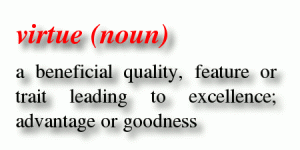Virtue

One of the primary goals of philosophy and religion is to live a virtuous life. However, philosophers and theologians have struggled for millennia to understand what it means to be virtuous. Socrates, Aristotle, Plato, the Stoics, the Epicureans, and the Cynics debated the nature and value of virtue in Ancient Greece, and both secular and religious scholars have debated the nature of virtue since the time of Christ.
The core principle of virtue is usually described as the Golden Rule, either in the prescriptive form of, "Do unto others as you would have them do unto you," or the proscriptive form of, "Do not do to others that which you do not want them to do to you." This meshes with the libertarian principle of nonaggression, which states that it is always immoral to initiate coercive force against another individual to violate his natural rights to life, liberty, and property as developed from the Lockean concept of natural rights.
Virtue is often also described as obedience, whether to a political authority or a religious authority. Here we find conflict. Note that by "authority" in each case, I mean a human being who claims special power over others. But obedience cannot lead to virtue, because virtue requires individual choice, and obedience to such human authorities means surrendering choice to the will of another fallible human being and refusing to apply reason for oneself. The greatest atrocities in human history were committed by obedient people, and that cannot be virtue.
We have seen many instances throughout history and current events where people have used the teachings of "religious leaders" to justify abominable acts. Whatever your opinions of religions, it should be apparent that those who seek to excuse violence are cherry-picking their scriptures seeking an excuse to commit such acts, and there cannot be virtue in seeking justification to do that which violates the Golden Rule. If there is a theological principle of virtue, it can only be in seeking to live in accordance with the natural laws established by the Creator as revealed through reason and special revelation.
Likewise, obedience to law is often called virtue, but the law in question is invariably written by human beings, and there is no shortage of examples for bad laws that excuse injustice. Slavery, prohibition, pogroms, and property confiscation policies are all manifestly unjust. When the law allows a political agent to do a thing that would be criminal if done by anyone outside the political power structure, there is a breach of the reciprocity principle. After all, how can it be virtuous for one person to do a thing, but not virtuous for another to do the exact same thing?
Legality, political authority, and religious authority all confer a counterfeit virtue to those who act upon their claims, resulting in a deeply-held belief that the actor is virtuous regardless of other considerations. This is why we must seek an understanding of virtue in order to confront injustice and spread the philosophy of liberty in order to encourage others to be virtuous by reminding them of their individual agency and power of reason, choice, and action.
None of this really helps define virtue itself, but it gives us a framework in which to explore the concept. Please comment below on what virtue means to you. What principles do you use to guide your own life, and what principles (if any) do you believe can be imposed upon others for a "greater good" or "public virtue?"
Image credit: this article on modern Stoic virtue ethics

If you like this post, please comment, follow, and resteem!

If you like this post, please comment, follow, and resteem!
"But obedience cannot lead to virtue, because virtue requires individual choice, and obedience to such human authorities means surrendering choice to the will of another fallible human being and refusing to apply reason for oneself. The greatest atrocities in human history were committed by obedient people, and that cannot be virtue."
"...we must seek an understanding of virtue in order to confront injustice and spread the philosophy of liberty in order to encourage others to be virtuous by reminding them of their individual agency and power of reason, choice, and action."
Fantastic, J! You were posting Bastiat for so long there, I almost forgot what a terrific writer you are, yourself. Upvoted and resteeming.
I only write well because I have read the works of a lot of good writers to see how it is done.
goals of philosophy great :)
informative post about philosophers :)
Good informative post about philosophers :)
PS: You have my Vote
Do not take it wrong, I would appreciate you helping me with a vote in my blog @raziell
Great information